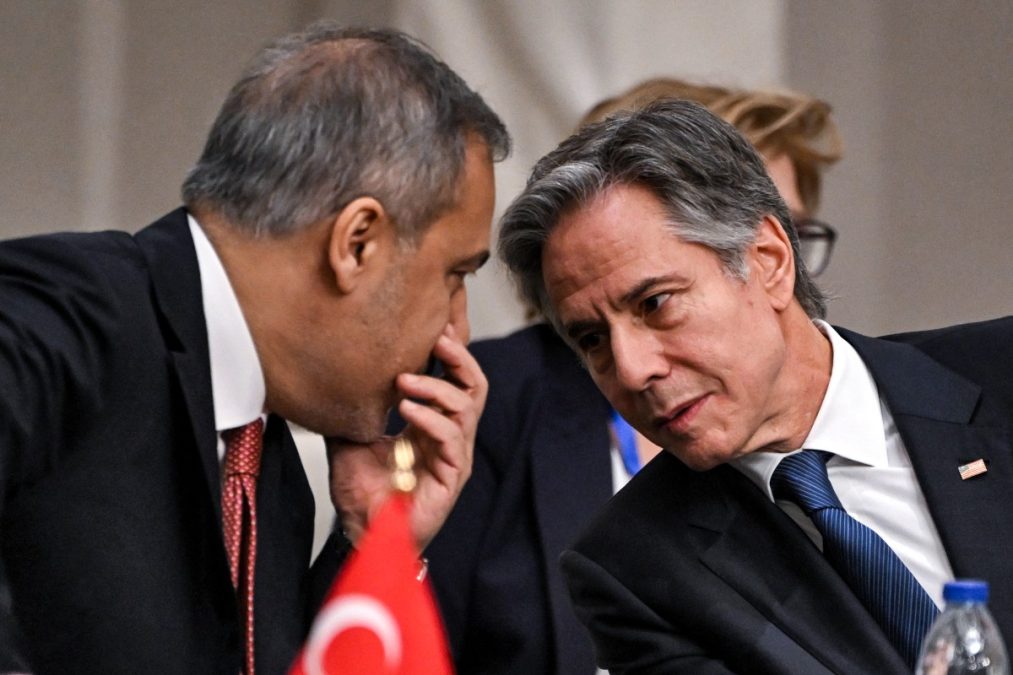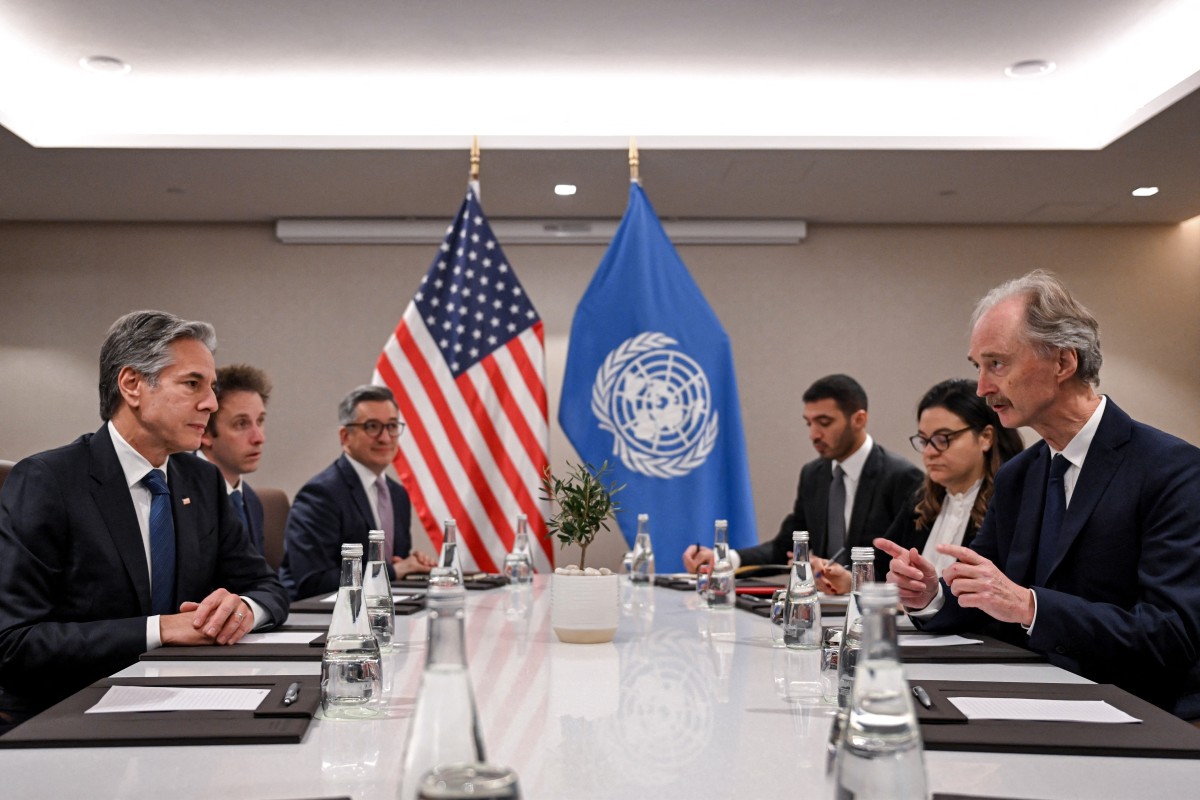Damascus, Syria – The United States said Saturday it had made contact with Syria’s victorious Hayat Tahrir al-Sham rebels, as Western and Arab states along with Turkey jointly voiced support for a united, peaceful Syria.
Secretary of State Antony Blinken’s comment on “direct contact” with the HTS rebels came despite the United States having designated the group as terrorists in 2018.
While Blinken and other diplomats held talks on Syria in Aqaba, Jordan, Turkey reopened its embassy in Damascus, nearly a week after the Islamist-led rebels toppled president Bashar al-Assad –and 12 years after Ankara’s diplomatic mission was shuttered early in Syria’s civil war.
“We’ve been in contact with HTS and with other parties,” Blinken told reporters, without specifying how the contact took place.
Ankara has been a major player in Syria’s conflict, holding considerable sway in the northwest, financing armed groups there, and maintaining a working relationship with HTS, which spearheaded the offensive that toppled Assad.
In a joint statement after the meeting in Jordan, diplomats from the United States, Turkey, the European Union and Arab countries “affirmed the full support to the Syrian people at this critical point in their history to build a more hopeful, secure and peaceful future”.
They called for a Syrian-led transition to “produce an inclusive, non-sectarian and representative government formed through a transparent process”, with respect for human rights.
“Syria finally has the chance to end decades of isolation,” the group said.
The head of the US-backed Kurdish-led Syrian Democratic Forces, in the country’s northeast, on Saturday appealed on X for Kurds “to adopt a favourable position toward the Syrian dialogue”.
UN special envoy for Syria Geir Pedersen urged participants in the Jordan talks to provide humanitarian aid and to ensure “that state institutions do not collapse”.
A Qatari diplomat said Friday that a delegation from the Gulf emirate would visit Syria on Sunday to meet transitional government officials for talks on aid and reopening its embassy.
Unlike other Arab states, Qatar never restored diplomatic ties with Assad after a rupture in 2011.
EU foreign policy chief Kaja Kallas said in Jordan that the bloc, Syria’s biggest aid provider, is “interested in rebuilding and reconstruction of Syria”.
Assad fled Syria last weekend, hours before rebel forces seized Damascus, five former officials told AFP.
His flight left Syrians in joyous disbelief at the sudden end to an era in which suspected dissidents were jailed or killed.
It capped more than a decade of war that killed more than 500,000 people and displaced millions.
‘So much tragedy’ –
Sunni Muslim HTS is rooted in Syria’s branch of Al-Qaeda and is designated a “terrorist” organisation by many Western governments.
But the group has sought to moderate its rhetoric. The interim government insists the rights of all Syrians will be protected, as will the rule of law.
“We appreciate some of the positive words we heard in recent days, but what matters is action -– and sustained action,” Blinken said.

If a transition moves forward, “we in turn will look at various sanctions and other measures that we have taken”, he added.
Pubs and liquor stores in Damascus initially closed following the rebel victory, but are now tentatively reopening.
“‘You have the right to work and live your life as you did before’,” Safi, the landlord of Papa bar in the Old City, said the rebels had told him.
But in Abu Dhabi, Anwar Gargash, a presidential adviser in the United Arab Emirates, said “we need to be on guard” despite HTS’s talk of unity.
Thousands of Syrians have swarmed the country’s notorious detention centres over the past week, seeking evidence that might lead them to loved ones who disappeared under Assad’s repressive rule.
Some former prisoners, like Mohammed Darwish, are also returning as free men to where they were once incarcerated, trying to find closure.
“When the door closed behind us, we were plunged into the depths of despair. This cell was witness to so much tragedy,” he said, back at his former windowless cell in a Damascus prison.
Syrians also face a struggle for necessities in a country ravaged by war, runaway inflation and years of sanctions.
The country’s situation remains highly volatile.
The Britain-based Syrian Observatory for Human Rights said an ambush Saturday had killed at least four rebel fighters when they were ambushed by “loyalist elements of the former regime” near a villa belonging to an Assad relative on the Mediterranean coast.
‘Dumb politics’ –
Assad was propped up by Russia — to where a former aide told AFP he had fled — as well as Iran and Lebanon’s Hezbollah militant group.
The rebels launched their offensive on November 27, the same day a ceasefire took effect in the Israel-Hezbollah war in Lebanon, in which Assad’s ally suffered staggering losses.
Naim Qassem, the leader of Iran-backed Hezbollah, admitted on Saturday that, with Assad’s fall, his group could no longer be supplied militarily through Syria.
He also said he hoped Syria’s new rulers saw Israel “as an enemy” and do not normalise ties with the country.
Both Israel and Turkey have carried out military strikes inside Syria since Assad’s fall.
The Syrian Observatory for Human Rights reported more than 60 Israeli strikes across Syria in several hours on Saturday.
To Gargash, the UAE adviser, such strikes are “dumb politics”, even though “to structurally degrade Syrian capabilities might be seen as a sensible thing from an Israeli practical point of view”.
Israel has also ordered troops into a UN-patrolled buffer zone that separated Israeli and Syrian forces on the Golan Heights, a move the UN said violated a 1974 armistice.
HTS leader Abu Mohammed al-Jolani, now using his real name Ahmed al-Sharaa, said the Israeli move “threatens a new unjustified escalation in the region”.
But “the general exhaustion in Syria after years of war and conflict does not allow us to enter new conflicts,” he said in an online statement.
Latest developments
Here are the main developments on Saturday:
US opens contact with HTS –
“We’ve been in contact with HTS and with other parties,” Blinken told reporters after the talks on Syria in the Jordanian Red Sea resort of Aqaba.
He did not give details on how the contact took place but when asked if the United States reached out directly, he said: “Direct contact — yes.”
The United States and other Western governments classify HTS as a terrorist group due to its roots in Al-Qaeda’s Syria branch
Few expect a quick move by the United States to lift the terrorist designation, especially with a political transition set next month following Donald Trump’s victory in the presidential election.
Blinken said that the easing of US sanctions on Syria imposed during Assad’s rule would depend on “sustained action” by the rebel-installed interim government to meet the expectations of the international community.
Main players agree common approach –
In Aqaba, the participants in the talks with Blinken issued a joint statement calling for a Syrian-led transition to “produce an inclusive, non-sectarian and representative government formed through a transparent process”.
It also stressed “respect for human rights”, the importance of combating “terrorism and extremism” and demanded “all parties” cease hostilities in Syria.
HTS says Syria too exhausted for war –
HTS leader Abu Mohammed al-Jolani criticised Israel for its incursion into southern Syria this week but said his country was too exhausted for fresh conflict.
“The Israelis have clearly crossed the disengagement line in Syria, which threatens a new unjustified escalation in the region,” he said, adding that despite the violation, “the general exhaustion in Syria after years of war and conflict does not allow us to enter new conflicts.”
Israeli troops entered the UN-patrolled buffer zone that separated Israeli and Syrian forces on the Golan Heights last weekend in a move the United Nations said violated the 1974 armistice agreement.
Hezbollah admits Syria supply lines cut –
The leader of Iran-backed Hezbollah, Naim Qassem, acknowledged his Lebanese group can no longer be supplied militarily through Syria after Islamist-led rebels toppled its ally Assad.
“Hezbollah lost a military supply line via Syria,” Qassem said, adding that “the resistance must adapt to the circumstances”.
Ultimatum to return state property –
The interim authorities gave a seven-day ultimatum for the return of stolen state property, warning: “Once that deadline has passed, anybody found guilty of concealing such property will be held liable and will face prosecution”.
Turkey reopens embassy –
The Turkish flag was raised over the diplomatic mission in Damascus, 12 years after it closed early in Syria’s civil war.
Ankara has been a major player in Syria’s conflict, financing armed groups in the northwest and maintaining a working relationship with HTS.
UAE finds Islamist ties ‘worrying’ –
A senior UAE official said his government had concerns about the Islamist affiliation of the rebels who ousted Assad.
“The nature of the new forces, the affiliation with the (Muslim) Brotherhood, the affiliation with Al-Qaeda, I think these are all indicators that are quite worrying,” said Anwar Gargash, a presidential adviser in the United Arab Emirates.
Hezbollah chief says lost Syria ‘military supply route’
The head of Lebanon’s Iran-backed Hezbollah admitted on Saturday his group can no longer be supplied militarily through Syria after Islamist-led rebels toppled Hezbollah ally Bashar al-Assad.
“Hezollah lost a military supply line via Syria,” Naim Qassem, whose group supported Assad during more than a decade of conflict in Syria, said in a televised address in which he added that “the resistance must adapt to the circumstances.”
Hezbollah leader hopes new Syria rulers don’t recognize Israel
Hezbollah leader Naim Qassem said on Saturday that Syria’s new rulers, who ousted the Lebanese armed group’s ally Bashar al-Assad, should not establish ties with neighbouring Israel.
“We hope that this new party in power will see Israel as an enemy and not normalise relations with it,” Qassem said in a televised speech, his first public remarks since Islamist-led rebels toppled Assad, who had Hezbollah’s military support during the civil war that began after a 2011 crackdown on anti-government protests.
The rebel forces launched their offensive on November 27, the same day that a ceasefire between Israel and Hezbollah took effect. On Sunday, they declared Damascus had fallen, with Assad having fled the country.
Iran-backed Hezbollah has suffered major blows during more than a year of cross-border fighting with Israel, which the Lebanese group had initiated over the Gaza war.
In late September, the clashes rapidly escalated into full-blown war.
In his speech on Saturday, Qassem maintained that the ceasefire agreement does not mean Hezbollah is required to lay down its weapons.
The deal stipulates that over a period of 60 days, the Lebanese army and UN peacekeepers would deploy in southern Lebanon, while Israeli military forces as well as Hezbollah militants withdraw from the border area — Hezbollah to the north, and Israeli troops back to their country.
Hezbollah was the only Lebanese armed group that refused to surrender its weapons after Lebanon’s 1975-1990 civil war, vowing to keep fighting Israel.








